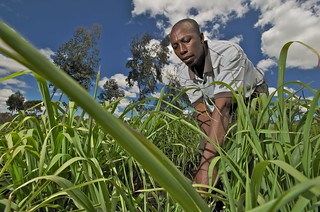In addition, the use of farmer trainers in agricultural extension is a cost-effective method of disseminating technologies to farmers because it is sustainable beyond the lifetime of development projects.
These are among several findings of a study carried out to assess the effectiveness of farmer trainers in disseminating agricultural technologies in western Kenya.
The findings are published in an article in the October 2012 issue of the Journal of Agricultural Education and Extension.
The principal author of the article Ben Lukuyu is a feed scientist at the International Livestock Research Institute (ILRI). The co-authors of the study, which was funded by the East Africa Dairy Development Project, are from the World Agroforestry Centre and the Kenya Forestry Research Institute.
The farmer trainer method of agricultural extension involves farmers sharing their knowledge and experience with other farmers as well as conducting experiments.
Through this participatory approach, a large number of farmers in communities can be reached at low cost through multiplier effects whereby farmers act as the main agents of change and technology adoption in their communities.
The study found that farmer trainers commonly used methods such as farm visits, community gatherings and field days to disseminate information on soil fertility practices, use of crop residues, food crops, vegetables and livestock technologies.
Farmer trainers also played important roles such as mobilizing and training their fellow farmers, hosting demonstration plots and bulking and distributing planting materials.
“The results from the study will be useful to development programs keen on using low-cost, community-based dissemination approaches,” the authors of the paper conclude.
The authors further recommend that the farmer trainer approach be promoted by extension service providers such as governments, non-governmental organizations and the private sector.
However, a cautionary note is sounded that the guidance provided for farmer trainer programs is suited to the conditions existing in western Kenya where the study was carried out and should therefore not be considered as best practices for uptake under general conditions.
Read the abstract of the article
Citation
Lukuyu B, Place F, Franzel S and Kiptot E. 2012. Disseminating improved practices: Are volunteer farmer trainers effective? Journal of Agricultural Education and Extension 18(5): 525-540.


No comments:
Post a Comment